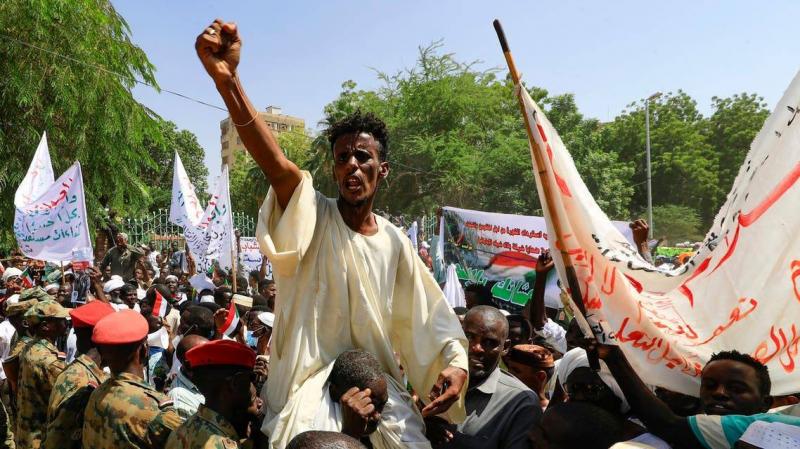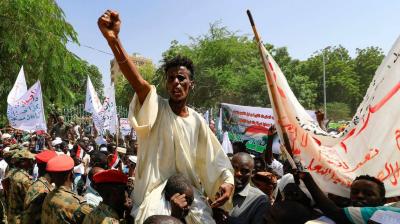As Sudan faces its largest political crisis in its two-year transitional period, demonstrators in the capital, Khartoum, blocked roads leading to the presidential palace today, Saturday, demanding the dismissal of what they termed the "hunger government." Protesters announced an open sit-in until the government is dissolved, concluding a day filled with gatherings of thousands in response to a call from the National Charter Forces for the Unity of the Forces of Freedom and Change to protest and demonstrate in order to "restore the revolution, dissolve the government, and reform the political framework of the transitional government to ensure broader participation for all change-makers."
Thousands of protesters from the reform wing of the Forces of Freedom and Change (which has split from the main group and includes several armed movements represented by ministers in the government) gathered in front of the presidential palace today.
Tension with Security Forces
This came after the governor of Khartoum earlier today confirmed that armed individuals prevented security forces from securing some vital facilities in the city. Ayman Khalid, in a statement, said that the Capital's Security Committee closed certain roads leading to sovereign sites in central Khartoum to protect public and private property. However, members of the police and intelligence forces were surprised by a group claiming affiliation with the armed movements that obstructed and prevented them from carrying out their duties.
Restoring the Revolution
The reform wing of the Forces of Freedom and Change had called in a statement last night for marches under the name of restoring the revolution, directing them towards the Council of Ministers for a sit-in where a national consensus charter will be signed, which was preceded by the splinter groups from the Forces of Freedom and Change last week.
These developments come amidst a sharp political division in Sudan's transitional ruling components following the foiled coup attempt last month (September), which has led to escalating media exchanges between the civilian and military components, halting meetings of the Sovereignty Council and joint meetings with the Council of Ministers. Meanwhile, political forces aligned with the Forces of Freedom and Change announced a new charter that ensures the participation of all revolutionary forces and expands the framework without excluding any other components.
Roadmap
Sudanese Prime Minister Abdullah Hamdok announced in a speech directed to the Sudanese people last night a roadmap to resolve the crisis, emphasizing the need to end the discord between the components of the revolution and broaden the transitional framework to include all components of the Forces of Freedom and Change. He also noted that the ongoing crisis in Sudan and the severe polarization between transitional components and political framework disputes are extremely serious. Furthermore, he clarified that the conflict in the country is a struggle between the camp of democratic transition and the camp opposing the revolution, affirming that he does not stand as a mediator in the crisis but is instead biased towards advocates of civil democratic transition.




